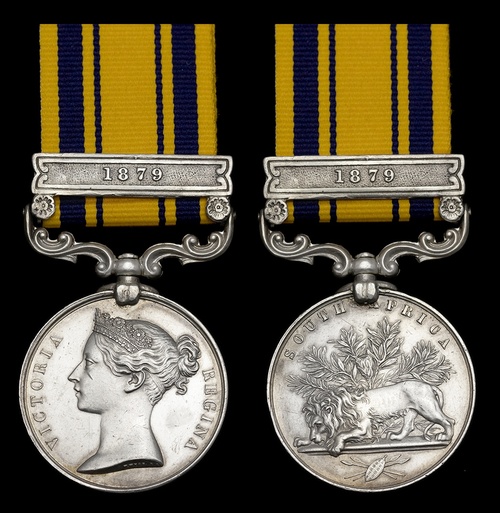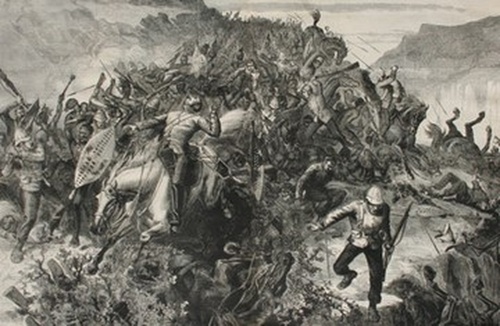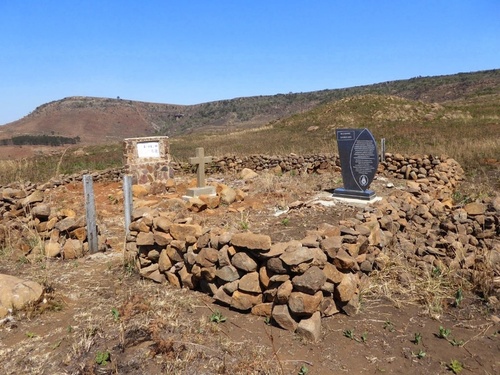Auction: 25001 - Orders, Decorations and Medals
Lot: 204
Staff
Some 48 Medals issued to the Staff, 3 of these to Interpreters and all with clasp '1879'.
'The Border Horse now began to fire at the distant snipers, and Wood waited to see what effect the shots might have. A Zulu suddenly popped up from a rock a scant fifty yards away and fired. Wood noted that the shot seemed low, but Lloyd fell back, exclaiming, "I'm hit - badly! My back is broken!" Wood and Campbell caught him and carried him down to the stone kraal. Wood then started back up, leading his horse, but a shot struck it and killed it, and when he regained the kraal he found that Lloyd had died. Wood now ordered Weatherley to take the Border Horse up to clear the trail, but the men balked again. Campbell then picked up Lysons and four privates from Wood's escort and started up the trail in single file, making for a cave from which several Zulus were firing. The narrow passage was only two feet wide between towering rock walls, and as Campbell plunged into the mouth of the cave, a Zulu fired a shot straight into his forehead, killing him instantly. Undaunted, Lysons and Private Edmun Fowler sprang over his body, driving the Zulus into the recesses of the mountain. Lysons then held the mouth of the cave while the others dragged Campbell's body back to the kraal…'
High drama on Hlobane Mountain on 29 March 1879; The Washing of the Spears by Donald R. Morris, refers
The outstanding South Africa Medal awarded to Mr. L. Lloyd, Evelyn's Wood's interpreter, who - in one of the most contentious episodes of the conflict - was mortally wounded in the disastrous action at Hlobane on 29 March 1879
South Africa 1877-79, 1 clasp, 1879 (L. Lloyd, Esq., Interpreter), suspension claw tightened, minor contact wear, very fine
Llewelyn Lloyd was a prominent casualty in the disastrous action fought at Hlobane Mountain on 28 March 1879, his death being indelibly linked to that of Captain Hon. R. G. E. Campbell of the Coldstream Guards, as outlined in Colonel Evelyn Wood's much quoted despatch to Lord Chelmsford. It was an episode in which incompetence played its role, amidst charges of cowardice, and has accordingly remained the subject of ongoing debate.
In fact, no history of the Zulu War would be complete without mention of this contentious chapter, some historians claiming that Wood (later Field Marshal Sir Evelyn Wood, V.C., G.C.B., G.C.M.G.) momentarily lost the plot.
An excellent account of events may be found in John Young's Horror at the Devil's Pass - The Battle of Hlobane, 28 March 1879, from which the following extract has been taken:
'…Dawn broke and a new horror became apparent. The Zulus were behind prepared barricades and concealed within caves that riddled the mountain, awaiting the assault. From behind their positions, the Zulus opened fire on the scaling troops. Two officers of the Frontier Light Horse, Lieutenants Otto von Stietencron and George Williams, fell dead, two troopers also fell to the fire.
Wood and his escort rode to the sound of the firing. Just below the summit of the mountain plateau they chanced upon Lieutenant-Colonel Frederick Augustus Weatherley and his Border Lancers. Weatherley's unit should have been with Buller, but during the storm they had become separated and now lagged behind. Wood spied a Zulu rifleman level his gun in his direction and he expressed his contempt of the Zulu marksmanship. The Zulu fired, and his bullet found its mark, shattering the spine of Mr. Llewelyn Lloyd, Wood's Political Assistant and his interpreter, who was at Wood's side. Wood attempted to lift the mortally wounded man, but stumbled under the weight. Captain the Honourable Ronald Campbell, Coldstream Guards, Wood's chief staff officer, came to his aid and carried the dying Lloyd out of the line of fire. Again a Zulu fired at Wood, killing his lead mount. The horse fell against Wood, and caused him to stumble.
A gasp went up from his men, fearing their commander wounded. Wood shouted a reassurance that he was not hit, and picking himself up, he made his way downhill to the troops' position. Angered at being pinned-down, Wood ordered Lieutenant-Colonel Weatherley to assault the position from where the fire was coming. Weatherley in turn, addressed his men, ordering them forward, but only Lieutenant J. Pool and Sub-Lieutenant H. W. Parminter responded to the command. The remainder of the Border Horse refused to assault the position, saying that it was unassailable. Captain Campbell was horrified; this was tantamount to mutiny - if not cowardice.
Campbell was of ennobled birth, the son of the 2nd Earl Cawdor. Such behaviour was unheard of within the class to which he belonged. Uttering his contempt of the fainthearted volunteers, he sprang forward towards the foe, supported by Second-Lieutenant Henry Lysons, 90th Light Infantry and four mounted infantrymen of Wood's personal escort, also drawn from the 90th. The small party advanced in a determined manner, clambering over boulders and through crevices, which led to the Zulu position. The path was so narrow that the advance could only be made in single file. Campbell gained the mouth of the cave first, only to be shot in the head at point-blank. Undeterred, Lysons and Private Edmund Fowler carried the position, forcing the Zulus to withdraw into a series of subterranean passages and, with Lysons and Fowler in pursuit, they killed all those who offered resistance, and put the others to flight.
With Lysons covering the cave mouth, Campbell's body was brought down and placed alongside Lloyd, who had succumbed to his wound. Fearful of the bodies being mutilated, Wood decided to bury them on the field. Being the son of a clergyman, he wished to conduct a proper burial service, only to realise that his service book was still in the wallets of his saddle on his dead mount. He ordered his bugler, Alexander Walkinshaw, to recover the prayer book. Walkinshaw, whom Wood described as "one of the bravest men in the Army," calmly strode up, under heavy fire and recovered not only the prayer book but also the entire saddle.
Wood had the two bodies removed some three hundred yards downhill, to where the soil was less rocky and the Zulus of Wood's escort dug the grave with their spears, under the watchful eye of Prince Mthonga. Their task completed, Wood committed the two bodies to the ground, reading an abridged version of the burial service from a prayer book which belonged to Captain Campbell's wife, who was the daughter of the Bishop of Rochester, Kent…'
Lieutenant Henry Lysons and Private Edmund Fowler, both of the 90th Regiment, were awarded the Victoria Cross.
Postscript
On 21 May 1880, Mrs. Campbell was taken to Hlobane where a headstone was placed on the grave of her husband and Llewelyn Lloyd. Some of the party, including Empress Eugenie, actually climbed up the Devil's Pass to the summit. Finally, they reached the site where the Prince Imperial was killed. Another memorial stone was laid and the empress planted cuttings of a tree she had brought from the family estate at Camden Place in Chislehurst. The grief-stricken party returned to England by the end of July.
Subject to 20% VAT on Buyer’s Premium. For more information please view Terms and Conditions for Buyers.
Estimate
£7,000 to £9,000
Starting price
£6500









